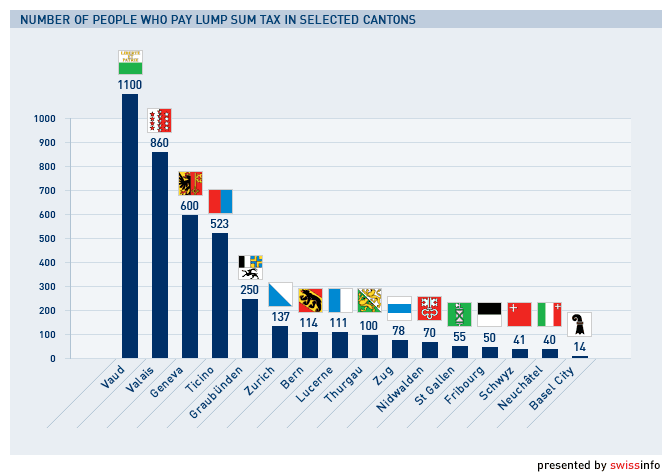Zurich hits rich foreigners, like Tina, in the pocket

Canton Zurich has closed its doors to wealthy foreigners who benefit from tax breaks after voters decided to end the "unequal" practice on Sunday.
The move may prompt rich individuals already living in Zurich, such as pop diva Tina Turner, Russian business tycoon Viktor Vekselberg and German milk baron Theo Müller, to take their homes and income elsewhere.
Some 52.9 per cent of the electorate – or 216,000 people – backed an initiative from the leftwing Alternative List political group to end “tax privileges for foreign millionaires”.
There are currently 137 rich people in the canton whose tax is not calculated on their income or wealth like other people, but who pay a lump sum usually based on five times the rental value of their Swiss property. This adds up to around SFr20 million ($17.3 million) a year, according to the authorities.
However, experts do not believe Zurich would suffer as much as other cantons, such as Geneva or Valais, that rely more heavily on such tax receipts to fund services. A 2007 survey from consultancy group KPMG found that lump-sum taxes accounted for 0.3 per cent of total income in Zurich compared to 5.2 per cent in Valais.
“Shooting your own foot”
“If I was the treasurer of canton Zurich, this would not be my biggest headache at the moment,” Jörg Walker of KPMG Switzerland told swissinfo.
“I don’t think the canton will have to alter its budget or tax system as a result. Taxes may have to be raised in the near future, but this would have more to do with less people earning money and fewer contributions from the corporate sector.”
But Walker noted that the long-term impact would become more pronounced over the years because more and more wealthy foreigners have relocated to Zurich in recent years.
“If we assume that this trend would have continued then we also have to calculate potential future revenues on top of past contributions,” he added.
Francois Micheloud of relocation firm Micheloud & Co., still accused the canton’s voters of scoring a goal against themselves. “In these times of troubled public finances it is a bit stupid to shoot yourself in the foot like this,” he said.
Micheloud added that Zurich was always more likely to vote the way it did because residents have fewer well-liked celebrities than other cantons. “People in Zurich have the impression that they are all Russian oligarchs,” he said.
Rich “more unpopular”
The lump sum taxation of wealthy foreigners had met with increasing opposition both in Switzerland and abroad in recent years. Both French and Swiss politicians questioned the moral legitimacy of French rock star Johnny Hallyday relocating to Switzerland in 2006.
The number of tax exiles in Switzerland reached 4,175 in 2006. That is up from 2,394 in 2003, according to KPMG.
Christian Wanner, finance director of canton Schwyz, believes the vote was influenced by recent negative headlines against “greedy” bankers.
“The debate has changed course during the course of the financial crisis and the bonus debate. There is now considerable displeasure towards big earners,” he told the Tages Anzeiger newspaper.
Wanner also believes that other cantons are now more likely than before to emulate Zurich voters.
swissinfo, Matthew Allen in Zurich
The tax is not based on income and wealth, as it is with ordinary Swiss residents.
Instead it is calculated on a minimum amount – generally the equivalent of five times the annual rent or the rental value of the house the taxpayer lives in.
Such a fiscal assessment is aimed at allowing taxpayers to maintain their previous lifestyle when they move to Switzerland.
Only foreigners with a residence permit are eligible for lump-sum taxation. They must not have a day-to-day professional activity or have worked in the country for at least ten years.
There are huge differences in the lump-sum tax levied by the country’s 26 cantons and the more than 2,600 local authorities.
More than 4,100 wealthy foreigners with residency status in Switzerland benefited from special tax treatment, according to 2006 figures by the cantonal authorities.
Most beneficiaries live on Lake Geneva and in the Valais, Graubünden and Ticino regions.
The lump-sum tax results in annual revenue of SFr392 million ($336 million) – between 1% and 2% of the total tax proceeds for the federal, cantonal and local authorities.
More than half of Switzerland’s 26 cantonal authorities offer a lump-sum scheme to rich foreigners. A number of cantons have residents who benefit from the preferential rate, according to 2005 figures by the federal authorities.
A proposal to scrap such fiscal breaks is pending in parliament. Two previous attempts by the centre-left failed.


In compliance with the JTI standards
More: SWI swissinfo.ch certified by the Journalism Trust Initiative












You can find an overview of ongoing debates with our journalists here . Please join us!
If you want to start a conversation about a topic raised in this article or want to report factual errors, email us at english@swissinfo.ch.